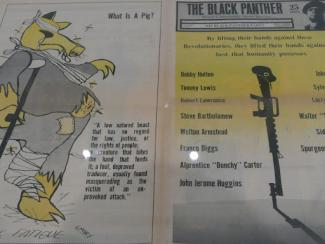
In 1968, Bobby Seale gave a speech describing a “hog in a spring.” The spring’s clean water is our liberation. The hog defiling it is a symbol of systems like imperialism, colonialism, and policing. And so, the “cop” would become the “pig.”
Huey P. Newton knew that Black people with roots in the rural South would get the association of police with pigs. They knew that pigs were dirty. Low-natured. But the use of the term wasn’t just an insult. It was a strategy.
To influence the public, the Panthers needed to change the language around policing. Calling the police pigs delegitimized and stigmatized them. Popular sayings like “The only good pig is a dead pig” helped normalize revolutionary messaging. That exact slogan became the topic of a congressional hearing in 1970.
And it wasn’t just words. It was images – Minister of Culture Emory Douglas’ specialty. His artwork portrayed pigs in uniform, Black figures slaying pigs, the political anatomy of pigs, and so much more. Pigs also weren’t just cops. They were politicians, military officers, and the ruling establishment.
These histories remind us that resistance movements don’t just fight to dismantle oppressive structures like policing, but to change the culture that produced them. How can we work to culturally delegitimize the criminal legal system today?